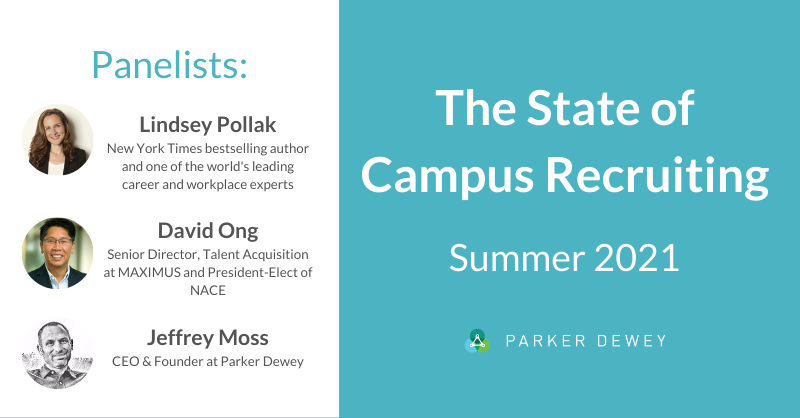
The Future of Work
It’s hard to believe January is almost over and yet many organizations are still in “wait and see” mode when it comes to summer internship plans as we continue to wait for COVID-19 vaccines to be widely available.
In case you missed it, our recent State of Campus Recruiting call took a look at some of the lessons learned to-date with going virtual. You can get a link to the replay and read a synopsis of the conversation on our blog.
As we continue to inch closer to spring, be sure to register for our next online event featuring students and recent graduates sharing their Micro-Internship experiences. We’ll take a closer look at why these programs specifically help to bring in students from underrepresented backgrounds and, as always, welcome your questions.
Jeffrey Moss, Founder and CEO
Articles of the Week
Making Remote Work Sustainable For 2021 And Beyond - Forbes
Lessons Earned Podcast with Michelle Weise - Strada Education Network
Soft Skills Are Essential To The Future Of Work - Forbes
Making Remote Work Sustainable For 2021 And Beyond - Forbes
“In the case of remote work, health can be restored when companies upgrade their temporary workplace flexibility plan into a comprehensive virtual organizational model that includes updates to infrastructure, protocols, and employee experience.”
Initially, businesses turned to remote work as an emergency response to the COVID-19 pandemic. However, now that U.S. employees have gotten used to working from home, 70% of them wish to continue working remotely, even after the pandemic is over. In order for businesses to establish a hybrid working environment, or even to become solely virtual, they need to update their infrastructure and policy.
Related reading: Tips for Bringing Your Internship Program Remote in the Midst of COVID-19
Lessons Earned Podcast with Michelle Weise - Strada Education Network
“The ability to sort of test out in slightly more low-stakes environments where you can see if [a job] is really the direction you want to go and understand and very transparent ways how you then navigate a way forward. So even if you took, say, something that was more like an immersive boot camp or on-ramp model and you don't have a degree yet, it becomes very clear how you then acquire a different kind of learning experience and add that to what you have.”
Futurists theorize that, along with an extended lifespan, future workers will have to work up to 100 years before retiring, changing careers many times along the way. To prepare for this future of extended work and career change, Weise emphasizes the need for Universities to teach interdisciplinary skills and the need for employers to provide opportunities for potential hires to learn new skills in a low-stakes environment.
Related reading: Skills Stability and Our Future Jobs
Soft Skills Are Essential To The Future Of Work - Forbes
“Soft skills strengthen other skills and abilities, and teams with these skills will be equipped to adapt more quickly and easily as the future of work continues to evolve.”
As work becomes more automated than ever, skills that cannot be duplicated by a machine are in high demand. Employers have found that the most successful employees have skills such as empathy, integrity, adaptability, self-motivation, and mindfulness.
Related reading: At the Core of Job Success: Why “Soft” Skills are Core Skills
For more stories and insights on HR, diversity and inclusion, and hiring, click here to subscribe to our weekly newsletter Hire Learnings




